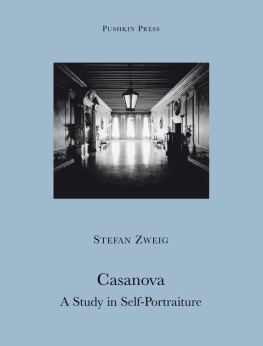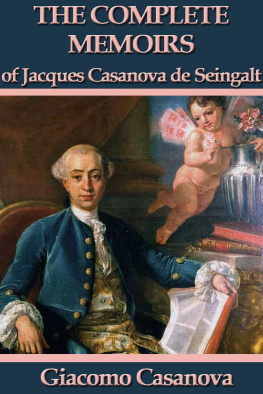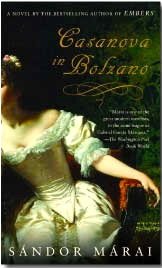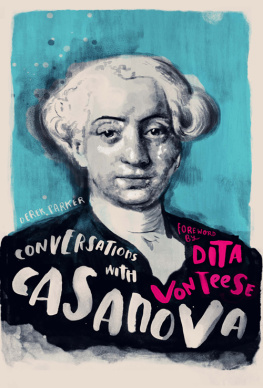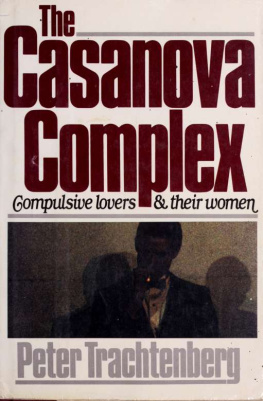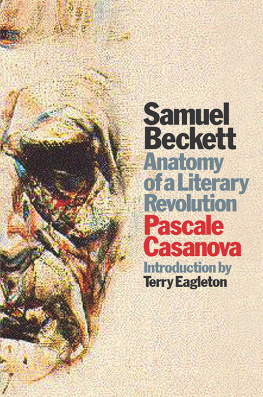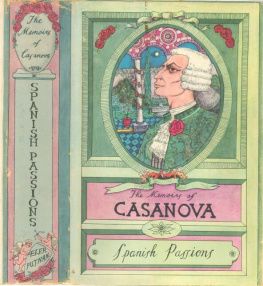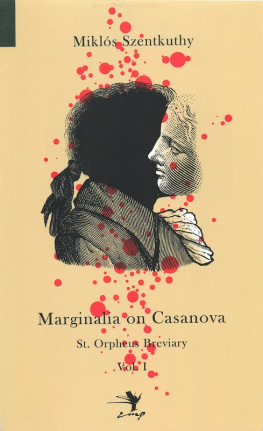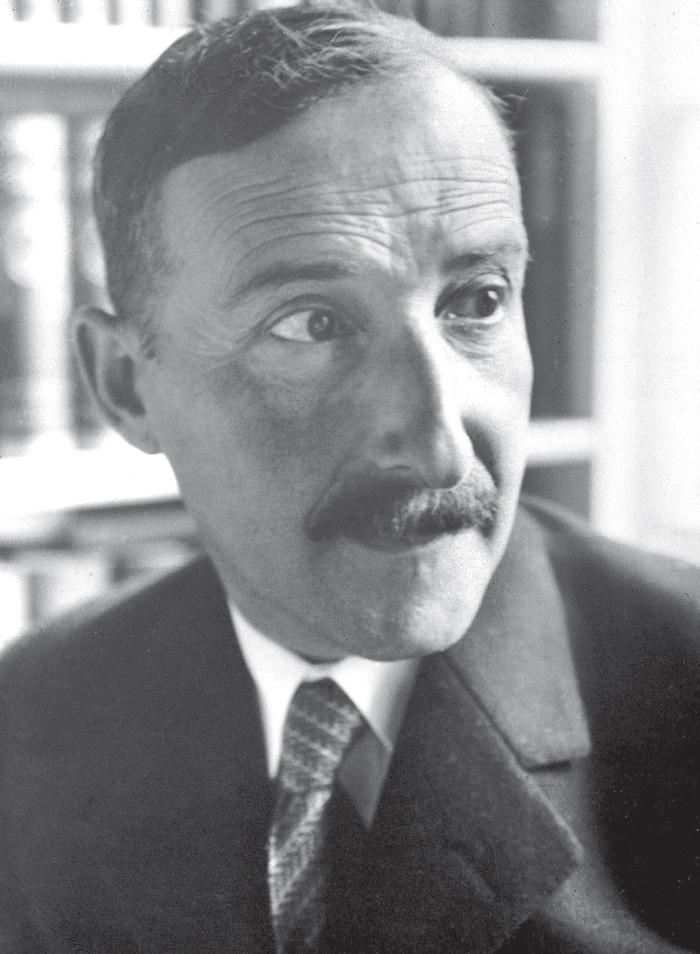He tells himself the story of his life.
This is his entire literary outputbut what a story!
C ASANOVA is an exceptional instance, a chance intruder in world literature, above all because this famous charlatan has as little right in the pantheon of creative geniuses as the name of Pontius Pilate has in the Creed. His rank as imaginative writer is as questionable as his invented title of nobility, Chevalier de Seingalt: the few verses he penned hastily between bed and the gaming table in honour of one lady or another reek of musk and academic paste; one who would read his Icosameron, a monstrosity of a Utopian romance, needs the patience of a lamb under the hide of a jackass; and when the excellent Giacomo begins to philosophise, it is hard to keep from yawning. In very truth, Casanova has as little claim to enter the company of great writers as he has to a place in the Almanach de Gotha; in both he is a parasite, an unwarrantable intruder. Nevertheless, this son of a shady actor, this unfrocked priest, this un-uniformed soldier this notorious cheat (a superintendent of police in Paris describes him in his dossier as a fameux filou), is able to ruffle it for a large part of his life among emperors and kings, and dies at last in the arms of a great nobleman, the Prince de Ligne: and, though he seems a mere pretender in the world of letters, one among many, ashes to blown about by the winds of time, his roaming shade has found a place for itself among the immortals. Here, too, is an even more remarkable fact. Whereas nearly all of his noble fellow countrymen, the sublime poets of Arcady, the divine Metastasio, the distinguished Parini, and the rest of them, are to be found only on the upper shelves of the libraries, have become material for dry-as-dust studieshis name, uttered with an indulgent smile, is still on everyones lips. According to all earthly probability, his erotic Iliad will still be very much alive, and will still find admiring readers, long after La Gerusalemme liberata and Il pastor fido have been gathering the dust of ages upon their unread tops. At one stride, the cunning adventurer has outdistanced all the great writers of Italy since Dante and Boccaccio.
Stranger yet, for such immense winnings, Casanova has staked nothing at all; he has overreached fate, and secured immortality by artifice. This gamester knows naught of the overwhelming sense of responsibility which burdens the true artist. Not for him the corve of unsociability which severs the writer overburdened with work from the warm world of everyday life. Casanova knows naught of the dread pleasure with which the author plans a book, or of the eagerness for perfection which is his tragic associate and torments like an unquenchable thirst. No part of his experience is the mute but masterful and ever unsatisfied demand of fancied shapes to be endowed with earthly circumstantiality, the longing of ideas to be liberated from earth and to soar upwards into the ether. He knows nothing of sleepless nights, followed by days which must be spent in the dull and slavish labour of polishing words and phrases, until at length the meanings shine with all the colours of the rainbow through the lens of speech; nothing of the multifarious but unseen toil of the creative writer, unrewarded and often unrecognised for generations; nothing of the man of letters heroic renunciation of the joys of life. Casanova, as everyone knows, took life easily enough, sacrificing not a morsel of his joys, not an hour of his sleep, not a moment of his pleasures to the stern goddess of immortality. He never lifted a finger to secure fame; and yet to him, born under a fortunate star, fame has come super-abundantly. As long as he had a gold piece or two in his pocket, a drop of oil with which to keep the flame of love alight, as long as he was still able to throw the dice, he had no thought of keeping company with the serious-minded spirit of art, or of soiling his fingers with ink. Only when all doors had been closed upon him, when women began to laugh at his amorous advances, when he was lonely, a beggar, and impotent, when the joys of life had become irrecoverable memoriesonly then, when he was a shabby and splenetic old man, did he turn to work as a substitute for livelier experiences. Only then, urged on by the lack of pleasure, by boredom, tormented by anger as a neglected cur is tormented by the mange, did he grumblingly set to work to tell the story of the septuagenarian Casaneus-Casanova, the story of his own life.
He tells the story of his own life. This is his entire literary outputbut what a story. Five novels, twenty comedies, a sheaf of novelettes and episodes, and a superabundance of fascinating situations and anecdotes, trodden like grapes to form the must of an exuberant narrative: the result is a life history which assumes the aspect of a perfectly rounded work of art though it has not had the ordering touch of the master of literary art. Herein we find the most convincing solution of that which at first seems the inexplicable mystery of his fame. What makes Casanova a genius is not the way in which he tells the story of his life, but the way in which he has lived it. The life itself is the great artists workshop, as at once his matter and his form. To this work of art, really and truly his own, he has given himself up with the creative ardour which imaginative writers in general devote to verse or to prose, glowing with the fiery resolve to stamp every moment, every still undecided possibility, with the highest dramatic expression. What another has to invent, he has actually experienced; what another must form in imagination, he has figured forth in his warm and voluptuous body; that is why, in this case, the pen and the fancy have no need to adorn the truth; enough that they should take a tracing of an existence which has already been effectively staged. No writer of his day, and scarcely a writer since (unless it be Balzac), has invented so many variations and situations as Casanova experienced; and throughout a whole century no man has ever lived a life swinging in such bold curves. Compare, as regards pure wealth of happenings (not as regards spiritual substance or depth of experience), the biographies of Goethe, Jean-Jacques Rousseau, and other contemporaries, with Casanovas own. How much they seem, regarded in the light of that comparison, to run in grooves; how monotonous, how narrow, how provincial appear these livespurposeful though they are, and animated with creative willbeside the elemental career of the adventurer, who changes countries, towns, estates, occupations, worlds, and women, as easily as he changes his shirt; who is everywhere and instantly at home; who is always ready to welcome new surprises. These others are but dilettantes in matters of enjoyment, just as Casanova is a dilettante in the world of letters. That is the eternal tragedy of the man of the spirit, that he, yearn though he may to fulfil his mission by experiencing all the voluptuousness of life, is nevertheless bound to his task, slave of his workshop, fettered by self-imposed duties, tied to order and to earth. Every true artist lives the larger half of his life alone, engaged in a duel with his creative work. Not in direct experience, but only through the mirror of fancy, may he enjoy the multiplicity of existence. To none but the uncreative, to none but the man of pleasure, to none but him who lives for lifes own sake, is it permitted to give himself unreservedly and directly to reality. One who aims at a goal must renounce the delights of hazard. What the artist creates in imagination is, as a rule, what he is debarred from actually living.

